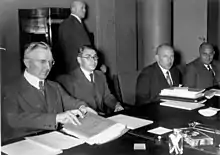Karl Blessing
Karl Blessing (5 February 1900 – 25 April 1971) was a German banker. He was President of the Deutsche Bundesbank from 1958 to 1969.
Karl Blessing | |
|---|---|
 The German representative in the Transfer Commission, 1934, from left: Hjalmar Schacht, Blessing, Emil Puhl , von Wedel | |
| President of the Deutsche Bundesbank | |
| In office 1958–1969 | |
| Personal details | |
| Born | 5 February 1900 Enzweihingen |
| Died | 25 April 1971 (aged 71) |
| Alma mater | Handelshochschule Berlin |
He was born in Württemberg, joined the Reichsbank in 1920 and graduated in Business Administration in 1925. In 1929 he became an assistant to then Reichsbank president Hjalmar Schacht and in 1934 he was seconded to the Reich Ministry of Economics. He became a member of the executive board of the Reichsbank in 1937 but was dismissed in February 1939 along with other board members for criticising Nazi economic policy.
Blessing's name was found in documents by Carl Goerdeler naming him as a potential Minister of Economics or President of the Reichsbank if the 20 July plot to kill Adolf Hitler had succeeded. He was not arrested by the Gestapo after the plot failed.
Recent historical evidence undercuts Mr. Blessing's statements that he was unaware of Nazi treatment of Jews: in 1941 he wrote a letter asking to take possession of an apartment the Gestapo had recently taken from a Jewish family.[1]
Shortly after retiring as President of the Deutsche Bundesbank in 1969 Blessing died in Rasteau, France aged 71. His grandson, Martin Blessing, was CEO of Commerzbank from 2008 to 2016.
